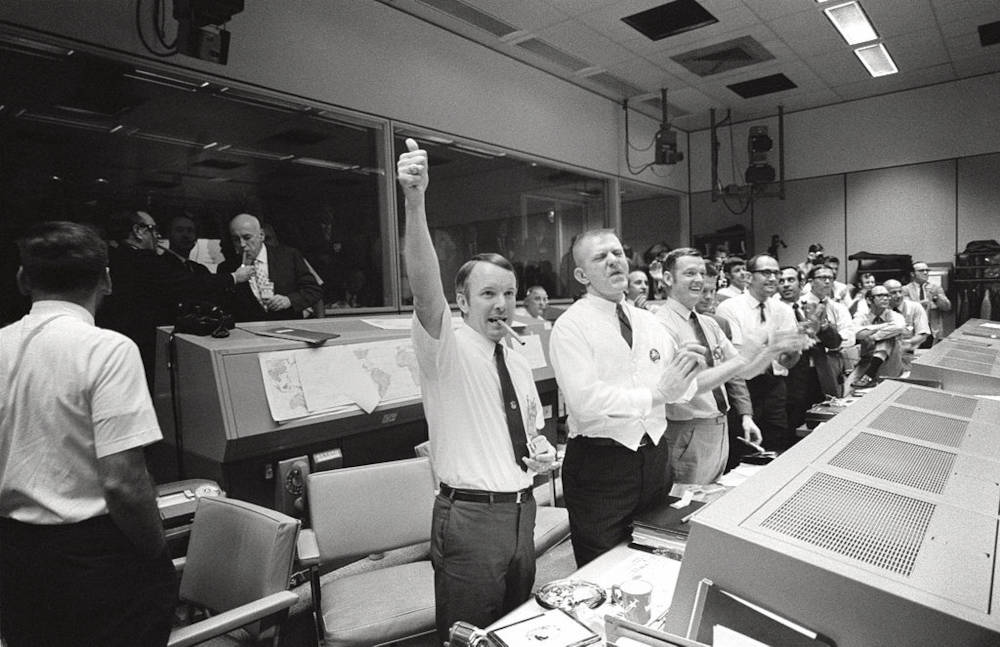[Mission Control celebrates the successful splashdown by the Apollo 13 crew. Lead flight director Eugene F. Kranz is second from left. Photo by NASA, Public domain, via Wikimedia Commons]
Good morning,
Gene Kranz, an aerospace engineer, played an important role in bringing the Apollo 13 crew to safety as the lead flight director in Mission Control. (Ed Harris played his character in the film Apollo 13, winning an Oscar nomination for best actor in supporting role.)
One of the key qualities that helped Kranz do his job was his ability to listen. In The Leadership Moment, Wharton professor Michael Useem describes what went on in Nasa’s mission control room.
He writes: “In requesting fast answers to key questions, Kranz repeatedly warned against the ‘satisficing’ pitfall. Don’t guess at anything, he told his engineers; know. As the Tiger Team planned Odyssey’s final plunge toward Earth, Kranz moved to the front of Room 210 and reminded his controllers that they would have to be extremely accurate since the spacecraft’s crippled state had made it far more intolerant of errors than ever before. ‘The key thing,’ he would say, ‘is to be right.’
“To be right is first to listen, then to decide. ‘The principal characteristic of a flight director is to be a good listener,’ Kranz would later recall. As the fate of Apollo 13 hung in the balance, Kranz had a wealth of console displays to study, and consult them he did, but far more important were the human displays he had on hand. Twenty specialists—flight planners, craft specialists, trajectory analysts, the astronauts themselves—were reporting to him simultaneously, and if the astronauts were to survive, this human input would spell the difference. ‘They’re providing you with information verbally,’ he observes, and ‘the flight director’s job is to listen to all of these people … and then to form an impression of what is going on and what we are going to do about it.’ Kranz’s flight world was akin to researcher Henry Mintzberg’s executive world: In watching what top managers do every day, Mintzberg found that they work primarily through personal dialogue with subordinates. Technical data merely supplement what they hear first from people.
“The information acquired through good listening is then filtered through and tested against the frames of experience. ‘You’ve got all of the sources of information, and then you have your own knowledge,’ says Kranz. ‘You’re accepting their input, then you’re testing its validity, and then you’re adding all the pieces together to get the total picture.’”
In this issue
- How to build a global company out of India
- The glass ceiling cracks
- A Sliding Door Problem
Have a good day.
How to build a global company out of India
In the latest edition of Hustle Fuel, Aparajita (Opu) Bhattacharyya talks to Neha Singh, co-founder of Tracxn Technologies. The conversation covered several themes including why Singh chose to be a generalist, how India’s startup ecosystem is evolving and what founders need to know about VCs. This extract from the summary of the conversation is about building a global organisation.
“Building their team of analysts and product developers wasn’t a challenge given India has been a back office for a lot of data companies. So, India, and Bangalore in particular, has a good talent pool.
“Their biggest criteria while hiring a product developer is problem-solving ability. She says, their product is a new platform, there’s nothing else that’s similar that they can refer to. The developer therefore also needs customer empathy (understand their work flow) and of course, attention to detail.
“While the team is local, it’s been a global play from day one. It was essential to build a global infrastructure because the market that Tracxn serves (private market investment opportunities) spans geographies and its customers (private market investors) benefit from a deep global lens on innovation.
“On the business side, customers need enterprise grade data and are willing to pay for it. For them price doesn't matter, they need actionable data, Neha says. In fact, they found more takers for their higher priced module. And that’s true for their Indian clients as well (at least in their segment, which is private market investors, and large corporates).
“What has helped them increase penetration is an ability to get into their clients’ daily work flow, start with one pain point at a time—and keep building workflow modules. And then have a good support team, she adds.
“They’ve also started offering clients personalisation in the product. Say, if someone wants to track health-tech or social impact startups, they personalise it to make it easy for them to track companies, sectors, and trends globally.”
Dig deeper
The glass ceiling cracks, finally
“The coronavirus pandemic appears to have given an unexpected boost to a small—but influential—cohort of India's working women,” Diksha Madhok from CNN’s bureau in New Delhi reported a few days ago. Her conversations with recruiters across the country have it that “educated women in middle-to-senior positions have seen job opportunities rise.”
“A recent survey [of] more than 300 companies in India found that women accounted for 43% of middle-to-senior management roles in 2020, a jump of more than 20 percentage points from the previous year,” she quoted.
This is good news for the diversity and inclusion agenda because despite crafting policies to attract women into the workforce, Indian women have chosen to stay away. Perhaps, this has to do with an implicit bias against women. Madhok’s report points to a pay gap of 22.5% in earlier years that tilts in favour of men.
On reading this report, we were reminded of our conversation with Chinmay Tumbe, author of The Age of Pandemics. The book chronicles the history of pandemics. One of the points Tumbe made was that in a pandemic, inadequacies get highlighted and that in turn leads to longer term change. “The first thing is we have to admit that we have a long way to go [to being a superpower]. We have such woeful medical and health infrastructure. Jobs are a fundamental crisis right now.”
Dig deeper
A sliding door problem

(Via WhatsApp)
Found anything interesting and noteworthy? Send it to us and we will share it through this newsletter.
And if you missed previous editions of this newsletter, they’re all archived here.
Bookmark Founding Fuel’s special section on Thriving in Volatile Times. All our stories on how individuals and businesses are responding to the pandemic until now are posted there.
Warm regards,
Team Founding Fuel
(Note: Founding Fuel may earn commissions for purchases made through the Amazon affiliate links in this article.)

